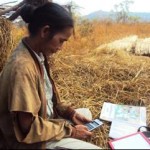
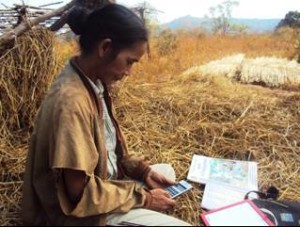 Acquisition of functional literacy is a crucial step in the process of improved livelihoods and alleviation of poverty. In and around the Seima Protection Forest (SPF), a World Education study in 2009 revealed that illiteracy and innumeracy are significant barriers to the successful implementation of community-based conservation efforts.
Acquisition of functional literacy is a crucial step in the process of improved livelihoods and alleviation of poverty. In and around the Seima Protection Forest (SPF), a World Education study in 2009 revealed that illiteracy and innumeracy are significant barriers to the successful implementation of community-based conservation efforts.
The Conservation through Literacy Project (CLP) was a joint project of World Education and Wildlife Conservation Society (WCS). The project goal was to increase the knowledge and practices of conservation among Bunong communities in the SPF area in Mondulkiri Province, Cambodia, through the implementation of a literacy and livelihoods programs.
The Conservation through Literacy Project worked in partnership with the Provincial and District Departments of Education and supported their efforts in nonformal education in Mondulkiri. In addition, community-level literacy working groups played an integral role in providing monitoring support to literacy classes and facilitators.
The project aimed to provide both functional and financial literacy pilot programs in the two target villages in the first year and worked closely with local NGO partner Cambodian Rural Development Team (CRDT), which will continue to implement activities into the future, thus promoting sustainability. Lessons learned in the pilot will be incorporated and it is hoped that the program can be expanded to villages throughout the SPF. The project was implemented from January 2010 through June 2011 and was jointly funded by World Education and WCS.
The Happy School (also known as Children for a Better Future) is a local nongovernmental organization (NGO) located in Phnom Penh which targets children of families in the poorest suburbs of the city who are vulnerable to unsafe labor, migration, exploitation, and other effects of poverty. World Education Cambodia partnered with World Education Australia (WEAL) and Australians for Cambodian Education (ACE) to assist the Happy School to integrate children into the formal education system or vocational training programs.
With support from WEAL, World Education Cambodia and ACE provided support and technical assistance to the school management team in the areas of financial and administrative management, development of by-laws and an advisory board, child protection policy development and implementation, staff recruitment and the overall process of being established as an official NGO in Cambodia. The project has helped provide two new classrooms and an office, in addition to improving the quality of education, increasing enrolment, and building the capacity of the board and staff.
In September 2009, the Happy School was officially approved for NGO status by the Ministry of Interior and registered under the name of Children for a Better Future. Children for a Better Future was officially endorsed by the Ministry of Education, Youth and Sport as a model nonformal school in Phnom Penh.
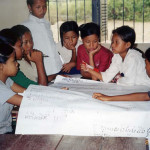
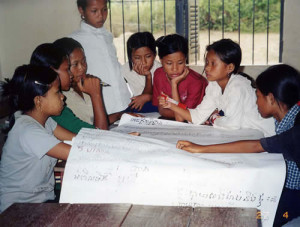 The Sports Diplomacy Project (SDP) aimed to reduce the presence of social dangers among ethnically mixed populations and promote community participation and improvements to the school environment through the construction of sports facilities, outreach awareness, and social events. The project was implemented in four provinces: Kampong Cham, Pursat, Kompong Chnang, and Kampot, and a total of thirteen primary, junior, and high schools, and three Islamic Centers in Sihanouk, Kandal, and Phnom Penh municipality. These target populations were selected based on reports from local authorities on demographics, school drop out rates, high drug use risks, high prevalence rates of migration, and areas in which Islamic schools were isolated from the state schools.
The Sports Diplomacy Project (SDP) aimed to reduce the presence of social dangers among ethnically mixed populations and promote community participation and improvements to the school environment through the construction of sports facilities, outreach awareness, and social events. The project was implemented in four provinces: Kampong Cham, Pursat, Kompong Chnang, and Kampot, and a total of thirteen primary, junior, and high schools, and three Islamic Centers in Sihanouk, Kandal, and Phnom Penh municipality. These target populations were selected based on reports from local authorities on demographics, school drop out rates, high drug use risks, high prevalence rates of migration, and areas in which Islamic schools were isolated from the state schools.
The Sports Diplomacy Project focused on constructing sporting courts and playgrounds in the targeted schools and communities, the promotion of social awareness-raising among youth, and designing local workshops and orientations in the community intended to promote key messages. These messages were disseminated through brochures designed for people of all ages to raise awareness on social dangers ranging from drug abuse, trafficking, child labor, and political extremism. World Education’s main implementation partner, Kampuchean Action for Primary Education (KAPE), ensured that these messages were effectively disseminated to communities not only in the 16 target areas identified by the U.S. Embassy but also in more than 100 schools with ethnically mixed populations.
World Education implemented the Sports Diplomacy Project in partnership with Impact International Solutions, Inc. (i2Si), KAPE, The O People, and the United States Embassy to Cambodia.
World Education was contracted by the Ministry of Education, Youth and Sport’s Cambodia Education Support Project (CESSP) to undertake a qualitative evaluation of its progress and impact. The aim of CESSP was to expand access to education services by addressing supply, demand, quality, and efficiency constraints with a special focus on the poor and underserved communities. By focusing on a small but representative sample of schools and comparing their performance with a control group of schools that had not benefited from project information, World Education consultants provided an objective report on the impact of activities to date, identified main lessons learned, and suggested ways in which the CESSP program might be improved in order to increase its impact.
The Schools for Life (SFL) Program, funded by USAID, expanded on the good practices and lessons learned from the 3 ½-year Educational Support for Children in Underserved Populations (ESCUP) Program. The project continued to address the issues of access and quality of education for marginalized youth in Cambodia through improved school management and educational capacity. A school grant component offered schools a choice of interventions appropriate to their context and need.
A total of 245 schools (220 primary and 25 lower secondary schools) in three target provinces in Cambodia received assistance under the SFL project. In all, SFL provided support to about 92,039 children and 2,439 teachers. The SFL project saw major increases in school efficiency with 59% of schools reporting a reduction in dropouts from baseline levels, while 64% of schools reported a decline in grade repetition.
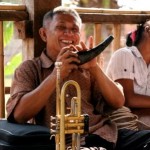
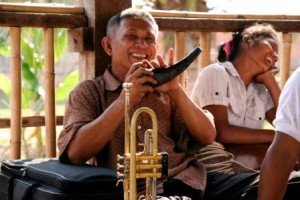 Cambodian Living Arts (CLA)—formerly known as the Cambodian Master Performers Project (CMPP)—was founded in 2000 by Arn Chorn-Pond, a Cambodian-American refugee who was featured in the Emmy-nominated movie, The Flute Player. A World Education project from 2001 – 2009, CLA worked to revive the traditional arts of Cambodia by pairing master teachers who survived the Khmer Rouge regime with young artists, thereby not only preserving the cultural heritage of Cambodia but also providing economic opportunities for artists.
Cambodian Living Arts (CLA)—formerly known as the Cambodian Master Performers Project (CMPP)—was founded in 2000 by Arn Chorn-Pond, a Cambodian-American refugee who was featured in the Emmy-nominated movie, The Flute Player. A World Education project from 2001 – 2009, CLA worked to revive the traditional arts of Cambodia by pairing master teachers who survived the Khmer Rouge regime with young artists, thereby not only preserving the cultural heritage of Cambodia but also providing economic opportunities for artists.
In September of 2009, the Cambodian Living Arts Project was transferred to the Marion Institute, where it continues this work. Please see: www.cambodianlivingarts.org.
The Cambodia Educational Media Initiative (CEMI) promoted the use of a range of media to strengthen efforts in Cambodia to promote quality education for youth of all ages.
The Initiative brought together two institutions with a strong commitment to building capacity to promote local responses to local issues. WGBH, one of the premier public radio and television institutions in the United States, focuses on high quality programming backed up by teacher professional development, community education and outreach. World Education, with its focus on formal and nonformal education and health programming for Cambodian youth and their families, partnered with WGBH to implement four areas of inter-related activities:
- Introduced media that supported early childhood education(eg, Sabai Sabai Sesame, Peep and the Big Wide World, with accompanying materials for parents and Early Childhood Education facilitators);
- Developed and used media in teacher education programs to support at risk children;
- Produced Khmer translations/adaptations of media that supported greater understanding of public health issues in Cambodia (eg, RX for Survival); and
- Promoted greater interest in and the preservation of Khmer performing arts(reinforced the efforts of programs like Cambodia Living Arts and the broader application of the performing arts in promoting health, education and personal safety).
In particular, the Initiative had focused on the first area, using media to improve the quality of early childhood education. Television ownership among rural Cambodian households has increased and at least 85% of the population regularly watches television. Studies have shown that high-quality educational television shows, such as Sesame Street and Peep and the Big Wide World, can help pre-school aged children gain certain cognitive and socio-emotional competencies. In Cambodia, where television is now ubiquitous even among the most disadvantaged and children lack access to appropriate early learning opportunities, television is an overlooked education opportunity. The Cambodia Educational Media Initiative (CEMI) has utilized two internationally renown educational children TV shows to take advantage of television’s potential to foster improved school readiness of Cambodia’s pre-schoolers.
- Sabai Sabai Sesame (2005-2008): World Education, Educational Television Cambodia (ETC), and WGBH adapted the US educational TV series, Sesame Street, for Cambodian broadcast. The Khmer version, known as Sabai Sabai Sesame was broadcast on television in Cambodia from December 2005 to the end of 2006, and targeted the pre-school and primary school age group. The show, adapted with culturally appropriate content, incorporates traditional music as well as academic and social messages.
- Peep and the Big Wide World and parenting education materials in partnership with the Ministry of Education (2007-2009): Since 2007, World Education has worked with UNCIEF Cambodia and the Early Childhood Education Department (ECED) of the Cambodian Ministry of Education, Youth and Sports (MoEYS) on an initiative that seeks to develop young children’s educational television and related parenting materials that complement ongoing work across the country to promote school readiness. The project focuses on building the capacity of parent educators to help parents promote their children’s school readiness through discovery learning play. The new Discovery Learning Play Training Package for Parent Educators will be used by district- and provincial-level government trainers, who are then responsible for training community parent educators. The locally-adapted TV show, Peep and the Big World, was developed through partnership with Khmer Mekong Films and Seven Color Studios and was specifically aligned to the national Early Learning Development Standards for Children aged 5-6 under this project. Each half-hour episode of Peep contains two animated stories in which the characters explore a phenomenon in the world around them, such as water, light or gravity. A parenting ‘spot’ and locally-made films were integrated into each Peep episode, showing parents how to make play a learning experience for their children and how to help their preschool-aged children develop skills that will help them be ready to learn when they start school. A total of 36 episodes were made and have been repeatedly shown on national television.
Influencing Parenting Behavior through PEEP and the Big Wide World
Although the right to a basic education is guaranteed to every Cambodian child in the country’s constitution, there continues to be a considerable gap between official policy and reality. The Educational Support for Children of Underserved Populations (ESCUP) Program, funded by USAID, was designed to increase access to and quality of basic education for underserved groups, including the poorest of the poor, disabled children, girls, and minority groups. ESCUP was implemented in the provinces of Kampong Cham, Kratie, and Mondulkiri.
Across these provinces, the program supported a total of 167 primary schools from 22 school clusters and 19 lower secondary schools. The overall program design has three overarching technical components—Access and Quality, Teacher Education, and School-Community Partnerships, and a fourth component, Program Management. The program’s technical approach includes (i) using cluster and secondary school grants as a means of resourcing schools, (ii) using activity menus in the development of school improvement plans, and (iii) utilizing local committees such as Local Cluster School Committees (LCSCs) to implement activities on the ground. Overall, the program seeks to promote the government’s recent adoption of Child Friendly Schools (CFS) as a front line strategy to improve quality in the basic education sector.
Program strategies to improve access involved the provision of scholarships to children at-risk (6,814 beneficiaries since start-up), increased penetration of the countryside through the use of Intermediate Classrooms, and adding extra grade levels to remote schools through the provision of Community Teachers. An important activity that occurred under ESCUP was the expansion of life skills programming, particularly IPM skills. The number of schools providing life skills courses reached 59 schools at primary level.
Over the course of its programming, ESCUP has supported 209 PTTC scholarship students as well as over 235 Community Teachers who are providing instruction to over 10,000 children who otherwise would not have had access to a teacher. A total of 1,043 primary school teachers (396 female), including Community Teachers, worked in program-supported schools and ESCUP provided technical support to about 476 of these teachers. Among secondary schools, there were 309 teachers (87 female) of whom ESCUP provided support to 98.
Repetition rates declined in 72% of schools from the baseline during the final year of the program. In addition, 76% of primary schools indicated a decline in the rate of dropout during the final year as well. Outreach to minority communities, strategies to reduce PTR levels and ease teacher shortages, scholarship support, health outreach to the physically challenged, Intermediate Classrooms, and life skills provisions have all played a major role in this success.
A significant number of Cambodia’s youth face difficulties with poverty, unstable home lives, substance abuse problems, and other factors that lead too many of them to a life on the streets. For many of these children, the lack of stability in their lives means they lack access to basic information to keep them healthy and protect themselves from diseases such as HIV and AIDS. The Ministry of Education, Youth and Sport (MoEYS), in recognition of the importance of reaching this population with HIV prevention education, entered into a partnership with World Education and Mith Samlanh to deliver the Vulnerable Street Children Program (VSCP). The goal of VSCP was to reduce HIV infections among street children in Phnom Penh through the dissemination of education and information to help them avoid risk behaviors related to HIV infection; in addition, MoEYS gained substantial in-house experience and knowledge about working with this population, culminating in their development of a strategy to work with these vulnerable youth directly in the future.
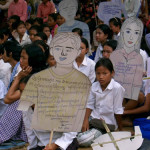
Cambodia serves as a country of origin, transit, and destination for both domestic and international trafficking networks. Girls and women are easy targets for traffickers, unaware of the dangers that lurk behind promises of good employment. They are a living testimony to the link between lack of education and vulnerability. The OPTIONS program worked to reduce the number of children, especially girls, who fall victim to trafficking and exploitation. The immediate objective was to ensure that children removed from or at risk of trafficking and exploitation were educated in programs relevant to their needs.
From 2004–2007, the OPTIONS Program was implemented in the rural districts of Banteay Meanchay, Kampong Cham, and Prey Veng Provinces, and in the municipality of Phnom Penh, which is the destination for many youth who migrate blindly, and as a result, are vulnerable to trafficking and commercial sexual exploitation.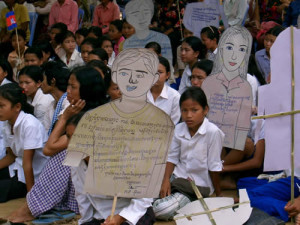
Over the course of four years, OPTIONS provided direct education services to 18,353 children (14,351 of whom were girls) in 126 primary schools, 24 secondary schools and 76 village-based nonformal education classes. In addition, at least 50,000 additional children (siblings, friends, and peers) received indirect benefits from OPTIONS through peer to peer outreach, mainstreamed life skills classes, awareness raising activities in schools and communities, and improved parental attitudes towards education. Other indirect beneficiaries included parents, village and commune-level leaders, teachers, school directors and district- and province-level government officials representing the Ministries of Education, Social Affairs, Women’s Affairs and Labor and Vocational Training.
A significant number of children were prevented from being exploited by having the opportunity to attend formal and nonformal education programs, and to develop the knowledge, skills and attitudes that can protect them from exploitation. Communities are now more aware of the dangers of trafficking and blind migration, and village and commune leaders reported that community members are more responsive to the needs of vulnerable children in the community. OPTIONS helped to increase local capacity to respond to the education and social support needs of children who are vulnerable to trafficking and commercial exploitation.
The OPTIONS program was funded by the U.S. Department of Labor with additional support from the McKnight Foundation and UNICEF. The program was implemented in partnership with Kampuchean Action for Primary Education, CARE International in Cambodia, and the Asia Foundation.
